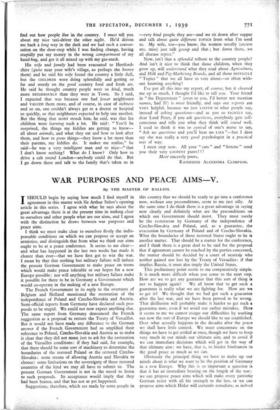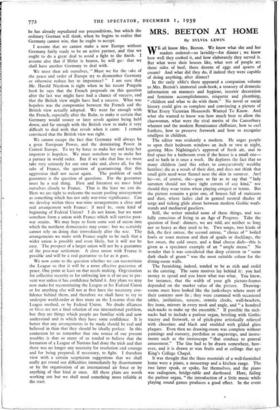WAR PURPOSES AND PEACE AIMS V.
By THE MASTER OF BALLIOL
T SHOULD begin by saying how much I find myself in 1 agreement in this matter with Sir Arthur Salter's opening article in this series. I agree with what he says about the great advantage there is at the present time in making clear to ourselves and other people what are our aims, and I agree with the distinction he draws between war purposes and peace aims. I think we must make clear to ourselves firstly the indis- pensable conditions on which we can propose or accept an armistice, and distinguish that from what we think our aims ought to be at a peace conference. It seems to me clear— and what has happened in the last two weeks has made it clearer than ever—that we have first got to win the war. I mean by that that nothing but military failure will induce the present German Government to make peace on terms which would make peace tolerable or our hopes for a new Europe possible : nor will anything but military failure make it possible for there to be in Germany a Government which would co-operate in the making of a new Europe.
The French Government in its reply to the overtures of Belgium and Holland mentioned the restoration of the independence of Poland and Czecho-Slovakia and Austria. Semi-official reports from Germany have declared such pro- posals to be stupid. We could not now expect anything else. The same report from Germany denounced the French suggestion as a proposal to restore the Treaty of Versailles. But it would not have made any difference to the German answer if the French Government had so amplified their reference to Poland, Czecho-Slovakia and Austria as to make it clear that they did not mean juit to ask for the restoration of the Versailles conditions: if they had said, for example, that there should be some sort of machinery to determine the boundaries of the restored Poland or the restored Czecho- Slovakia : some means of allowing Austria and Slovakia to choose: some limitations on the sovereignty of those restored countries of the kind we may all have to submit to. The present German Government is not in the mood to listen to such proposals. Its acceptance would imply that they had been beaten, and that has not as yet happened.
Suggestions, therefore, which are made by some people in this country that we should be ready to go into a conference now, without any preconditions, seem to me just silly. At the same time I do think there is a great advantage in saying now clearly and definitely what are the preconditions on which our Government should insist. They must surely be the restoration by Germany of the independence of Czecho-Slovakia and Poland, and, as a guarantee, the evacuation by Germany of Poland and of Czecho-Slovakia. What the boundaries of those restored States ought to be is another matter. That should be a matter for the conference, and I think there is a great deal to be said for the proposal that if agreement cannot be reached by the parties concerned, the matter should be decided by a court of neutrals who neither gained nor lost by the Treaty of Versailles : if that implies Russia, it must also imply the United States.
This preliminary point seems to me comparatively simple. It is much more difficult when you come to the next step. How are we to get any guarantee that this sort of thing is not to happen again? We all know that to get such a guarantee is really what we are fighting for. How are we to get it? We thought that we had got such a guarantee after the last war, and we have been proved to be wrong. That disillusion will probably make it harder to get such a guarantee now, even if we avoid our earlier mistakes. Here it seems to me we cannot escape our difficulties by working out now the sort of Europe we should like to see established. Over what actually happens in the decades after the peace we shall have little control. We must concentrate on the things we have to get settled at once, though we have to keep very much in our minds our ultimate aim, and to avoid if we can immediate decisions which will get in the way of that ultimate aim: we have, that is, to hinder hindrances to the good peace as much as we can.
Obviously the principal thing we have to make up our minds about is what we want to be the position of Germany in a new Europe. Why this is so important a question is that it has an immediate bearing on the length of the war: we can propose peace aims which will make every patriotic German resist with all his strength to the last, or we can propose aims which Hitler will certainly renudiate. as indeed he has already repudiated our preconditions, but which the ordinary German will think, when be begins to realise that Germany cannot win, that he ought to accept.
I assume that we cannot make a new Europe without Germany fairly ready to be an active partner, and that we ought to do a great deal to avoid a fight to the finish. I assume also that if Hitler is beaten, he will go: that we shall have another Germany to deal with.
We must then ask ourselves, " Must we for the ..,ake of the peace and order of Europe try to dismember Germany or otherwise reduce her to impotence? " I am sure that Mr. Harold Nicolson is right when in his recent Penguin book he says that the French proposals on this question after the last war might have had a chance of success, and that the British view might have had a success. What was hopeless was the compromise between the French and the British view actually adopted. We went far enough with the French, especially after the Ruhr, to make it certain that Germany would sooner or later revolt against being held down, and far enough with the British view to make it very difficult to deal with that revolt when it came. I remain convinced that the British view was right.
We cannot escape the fact that Germany will always be a great European Power, and the dominating Power in Central Europe. To try by force to make her and keep her impotent is hopeless. We must somehow try to make her a partner in world order. But if we take that line we must take very seriously for our own sake and, above all, for the sake of France, the question of guaranteeing that this aggression shall not occur again. The problem of such guarantee is the question of questions. For the guarantee must be a real thing. First and foremost we must bind ourselves closely to France. That is the least we can do. Here we are right to welcome the recent pooling arrangement as something which has not only war-time significance. Can we develop within these war-time arrangements a close and real arrangement with France: if need be, some kind of beginning of Federal Union? I do not know, but we must somehow form a union with France which will survive post- war strains. We may hope to form some sort of union into which the northern democracies may come : but we certainly cannot rely on doing that immediately after the war. The arrangements we make with France ought to be such that a wider union is possible and even likely, but it will not be easy. The prospect of a larger union will not be a guarantee of the post-war settlement. A close union with France is possible and will be a real guarantee so far as it goes.
We now come to the question whether we can reconstitute the League so that it will be a more effective guarantee of peace. One point at least on that needs making. Organisation for collective security or for enforcing law is of no use to pre- vent war unless it has confidence behind it. Any plans we may now make for reconstituting the League or for Federal Union or for anything else will not at first have the necessary con- fidence behind them, and therefore we shall have to try to underpin world-order at first more on the Locarno than the League method, or by Federal Union. No doubt alliances or blocs are not a final solution of our international problem, but they are things which people are familiar with and now understand and in which they have some confidence. It is better that any arrangements to be made should be real and believed in than that they should be ideally perfect. In this connexion let us remember that one source of our present troubles is that so many of us tended to believe that the formation of a League of Nations had done the trick and that there was no longer any necessity for resolution and courage and for being prepared, if necessary, to fight. I therefore view with a certain scepticism suggestions that we shall really get round our difficulties immediately by disarmament or by the organisation of an international air force or by anything of that kind at once. All these plans are worth working out but we shall need something more reliable at the start.













































 Previous page
Previous page